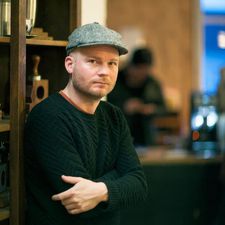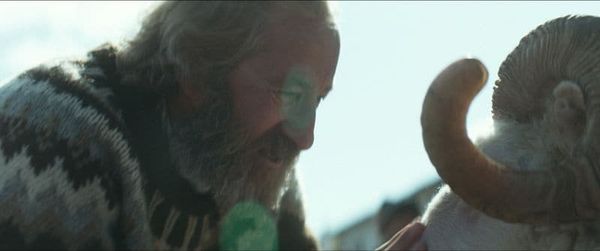Not bad for a film about sheep farming and a 40-year stand-off between two brothers. The idea may sound simple but Hákonarson's harnesses deep emotions for his humanistic exploration of the relationship between Gummi (Sigurður Sigurjónsson) and Kiddi (Theodór Júlíusson), which comes under added pressure after an outbreak of lethal scabies results in a cull of their sheep. Initial scenes suggest a dark comedy but as the film progresses it shifts into a much more tragic gear.
Hákonarson says he deliberately kept the humour dry and subtle so that it didn't overwhelm the film's dramatic thrust.
"There's a lot of serious stuff going on," says Hákonarson. "I wanted to establish some humorous tone and keep it throughout the whole movie. The set-up of the story, these two brothers living next to each other and not speaking is naturally kind of comical.
 |
| "There's a good kind of team spirit at least among the younger generation in Iceland." Photo: Ernir Eyjolfsson |
The sheep are key characters in the film, pampered and herded by the brothers but given that sheep have a tendency to run away from humans, didn't that make shooting tricky?
"I took both main actors to farms and let me do an intellect rehearsal, talking to farmers to try to get into the mind-set," says Hákonarson. "But also some practical rehearsal with sheep. I let them learn how to speak to the sheep. We had some professional farmers on the set who were advising us and there was a farmer who was training the sheep. We actually did a sheep casting and we found sheep who were used to being around humans, because most sheep will just run away. They were a little bit like dogs, they were quite use to humans and that was important."
A dog also plays a crucial role in the film - running messages between the brothers and their only means of communication.
"We were just lucky," admits Hákonarson. "We shot it in the north of Iceland and there was just one person in the area who was a dog trainer, so there was no other option. But she did a really good job. She had to train the dog to deliver the letter for a few months. We used a lot of tricks. There were sometimes people standing in the picture, like the dog trainer, and we had to take her out in post-production."
A key scene in the film takes place in a snowstorm at night with the sheep, which Hákonarson says was a challenge for a director like him, whose background is documentary rather than action.
 |
| "All the farmers I've met say that Rams is the most realistic rural film they've seen" Photo: Sturla Brandth Grøvlen |
Speaking about collaboration with other Icelandic filmmakers, the director points out that it is a small country. So small, in fact, that he, Virgin Mountain director Dagur Kári and Sparrows director Rúnar Rúnarsson all went to the same high school - he and Rúnarsson were both born in 1977.
I suggest his film would work well in a double-bill with something by Kári.
"He has a similar kind of humour," says Hákonarson "I don't know if you can call it an Icelandic New Wave but there are a lot of new directors.
"In Iceland we don't have any professional script doctors, like in bigger countries, so we have to read each other's scripts. So Runar reads my scripts and gives me comments and I read his scripts. So we have a close professional relationship. We are friends. We can have beer together and there's a good kind of team spirit at least among the younger generation in Iceland.
 |
| Grímur Hákonarson: "Our main aim was to make it look real - the acting, the costumes, the set, the cinematography" Photo: Sturla Brandth Grøvlen |
"Runár and Dagur were educated in Denmark, in a Danish film school and I was educated in Prague, so most of us have to go abroad to get the knowledge and education. Most of us go abroad and stay abroad for some years and then you come back and tell Icelandic stories."
One of the key themes in Icelandic stories of late is alcohol. It plays a big part in Sparrows and the older brother in Rams also has a drink problem.
"I have been travelling with Rams for a few months and then I came back to Iceland and went out for a few drinks and I noticed the Icelandic people in the bars, they are much more drunk than in other countries," says Hákonarson. "Our drinking culture is all about drinking more than the next person.
"When I got to film festivals I'm sometimes happy that there's no other Icelandic director at the festival because then I can stay sober and take it easy.
 |
| Grímur Hákonarson: "I had some nightmares about filming in a snowstorm in sheep - I was really worried about it." Photo: Sturla Brandth Grøvlen |
As for the Foreign Language statuette, he admits "It's a fulltime job not thinking about the Oscars. Now you're ruining my day by asking me. I'm trying not to think about it. I'm trying to work on a new script, to focus on something else."
Shifting his focus seems to be paying off, as he has not one but two films coming up - Little Moscow and The County - one factual and one fictional.
"I'm filming a documentary called Little Moscow about a Communist fishing village in the east of Iceland," he says. "There used to be a very strong socialist movement there and it's an historical film. And I'm working on a script, a rural lesbian story The County. It's about a middle-aged woman who is in a process of self-discovery in a rural community and it's going very well, apparently. I am, of course, excited by all these awards but I try not to think about it.
"It's funny you mention alcohol because also in The County one of the themes is alcoholism. In our filmmaking, we are not pretending to be something other than we are. We are telling these contemporary and humanistic stories about Icelandic people and we are not trying to make action thrillers and scifi movies. We are not trying to compete with the big genre movies.
"Our main aim was to make it look real - the acting, the costumes, the set, the cinematography. That it feels from the beginning that they are just real farmers and you are inside their lives."
Rams will be released in the UK on February 5. The US release is currently expected to also be February






















